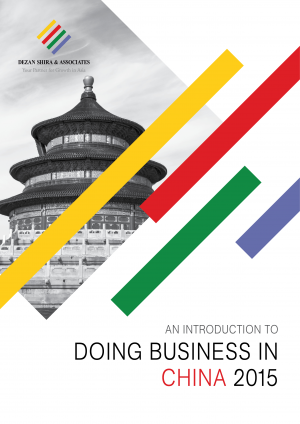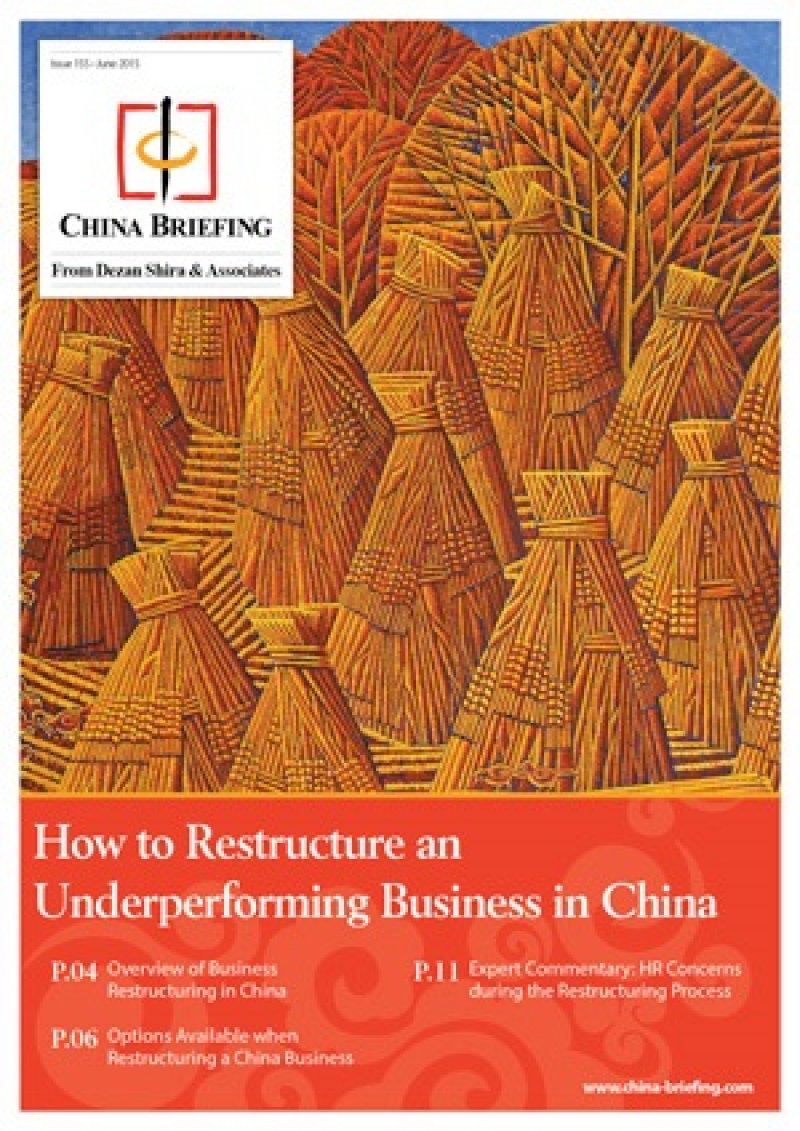Strategic Considerations when Establishing a WFOE in China, Part 3: VAT and Corporate Governance
By Chet Scheltema and Vivian Mao
Dezan Shira & Associates, Shanghai
General VAT Taxpayer Status
China is completing its transition to a value-added tax (VAT) system. China’s VAT is an indirect tax on business transactions imposing a rate of three percent to 17 percent of the transaction amount. As is readily obvious, this can translate into a sizeable tax burden if one does not properly manage value-added taxation.
The key to managing the VAT system for some companies may lie in becoming a “general VAT taxpayer” and obtaining the right and ability to use input VAT credits to offset output VAT, thereby potentially reducing the VAT burden by a substantial amount. Although general VAT taxpayer status can theoretically be obtained at any point in a WFOE’s life, it may be easiest and most advantageous to obtain it upon incorporation, otherwise one may need to wait until the annual turnover reaches a certain threshold. Because investors cannot always be sure when such annual turnover thresholds will be reached, they may seek to obtain such general VAT taxpayer status immediately upon incorporation of the WFOE.
![]() RELATED: Strategic Considerations when Establishing a WFOE in China, Part 2
RELATED: Strategic Considerations when Establishing a WFOE in China, Part 2
The question of whether or not to immediately seek general VAT taxpayer status will depend upon the business activities of the WFOE and its business goals. This is the beginning of tax planning for any WFOE established in China, so experienced Chinese tax professionals should be consulted. To give an example of where general VAT taxpayer status may be critical and where it may be disadvantageous, consider the following. If a WFOE does not anticipate ever generating revenue from its activities in China (Eg, it is functioning as a “cost center” for its foreign headquarters or it is a not-for-profit), then it may be tax efficient to maintain its status as a small-scale VAT taxpayer, because the output VAT rate for such a taxpayer is only three percent. Any “consulting” arrangement with its foreign shareholder for purposes of funding the WFOE would in theory only be subject to three percent as opposed to six percent for a general VAT taxpayer. However, if the WFOE is a trading WFOE and will begin to import and sell expensive equipment to the domestic Chinese market, then the applicable VAT rate will likely be 17 percent both upon import and upon sale to the domestic market. It is therefore critically important for such a trading WFOE to promptly obtain general VAT taxpayer status in order to use its payments for import VAT to offset against (deduct against) its output VAT payments made upon sale to the domestic market.
What many an investor may not initially be aware of is that the application process for general VAT taxpayer status may include an inspection and evaluation of the office space of the WFOE to assess the legitimacy of the WFOE’s operations. Abuse of the VAT system and fraudulent activity are rife in China, and authorities are traditionally strict about which new WFOEs are granted general VAT taxpayer status, although this appears to be changing and the practice may vary from city to city.
Because of the possibility of undergoing such an inspection, it is important to keep in mind the tax bureau’s criteria for assessing a general VAT taxpayer applicant when initially selecting a registered address and an office space. Previous clients registering a WFOE with a “virtual address” have scrambled to replace the virtual address with a real and more credible office space and registered address when they realized the potential consequences to their general VAT taxpayer application. For more on this subject, read the China Briefing article, General VAT Taxpayer Status: Why It’s So Critical and How to Secure It.
Corporate Governance
Designing effective corporate governance for your WFOE should focus on at least the following two strategic decisions.
First, seek to avoid concentrating too much authority and operational control in the hands of a few individuals whose interests are closely aligned, could potentially grow adverse to those of the investors, and who are beyond effective accountability. For example, an investor should seek to avoid selecting a general manager that is also the Legal Representative (or where the position of Legal Representative is held by a close friend or relative). Also be aware of who holds and controls the WFOE’s chops. Is it the same person holding other critical positions in the company, or whose friends and family hold such positions? Also pay attention to who are the registrants of the bank account, and who selects and supervises the WFOE’s accounting and audit firms. Although such a structure may seem attractive because it streamlines the decision-making process in China, it is fraught with risks. The author continues to see instances where a WFOE has effectively been hijacked by disgruntled employees, because too much authority had been concentrated in too few hands, and when the shareholders sought to restructure the organization, the concentration of authority allowed such employees to disrupt the shareholders’ plans for change. For more information, read the China Briefing article, Anatomy of a Corporate Hijacking: How Your Chinese Company Can Be Hijacked and How to Prevent It.
![]() RELATED: Corporate Establishment Services from Dezan Shira & Associates
RELATED: Corporate Establishment Services from Dezan Shira & Associates
Second, take special care to select an appropriate Legal Representative. The position of Legal Representative in a WFOE (or any Chinese company) is a critically important and powerful position effectively imbued with full authority (and responsibility) to legally bind the WFOE. To replace the Legal Representative is a tedious, lengthy process where the original business license and electronic records of the relevant Chinese supervisory agencies of the WFOE must be amended. This can require several months to complete. Meanwhile, the currently registered Legal Representative would be able to act with all the apparent authority of the WFOE.
Assuming the Legal Representative is fully trustworthy and is subject to healthy accountability, another consideration comes to the fore. Since the Legal Representative legally holds full authority to bind the corporation, he/she is also typically regarded as being fully responsible for the acts of the WFOE, even if not specifically authorized. Legal Representatives can in theory be held personally responsible for the debts of the WFOE. There have been incidents recently in China where the Legal Representative (and sometimes other senior officers) have been detained and denied the right to leave China until commercial disputes are resolved, or the Legal Representative could be “blacklisted” in China and refused the right to become a senior manager in a Chinese enterprise and potentially be exposed to other recriminations. For these reasons, WFOE investors may consider appointing a Legal Representative that does not reside in China, since his/her signature is typically only required two to three times a year, and thereby attempt to shelter the individual from adverse recriminations. Please note that the Legal Representative may be required to visit China during the incorporation process, such as when the bank account is opened.
Conclusion
Establishing a Chinese WFOE for the purpose of doing business in China presents a foreign investor with tremendous opportunity. China’s regulatory environment is not particularly difficult to understand, but it can be tricky to manage and decisions once made can prove difficult and costly to unwind. It is therefore important to think deliberately, to act strategically and to consult with experienced and knowledgeable China practitioners.
|
Asia Briefing Ltd. is a subsidiary of Dezan Shira & Associates. Dezan Shira is a specialist foreign direct investment practice, providing corporate establishment, business advisory, tax advisory and compliance, accounting, payroll, due diligence and financial review services to multinationals investing in China, Hong Kong, India, Vietnam, Singapore and the rest of ASEAN. For further information, please email china@dezshira.com or visit www.dezshira.com. Stay up to date with the latest business and investment trends in Asia by subscribing to our complimentary update service featuring news, commentary and regulatory insight. |
![]()
 An Introduction to Doing Business in China 2015
An Introduction to Doing Business in China 2015
Doing Business in China 2015 is designed to introduce the fundamentals of investing in China. Compiled by the professionals at Dezan Shira & Associates, this comprehensive guide is ideal not only for businesses looking to enter the Chinese market, but also for companies that already have a presence here and want to keep up-to-date with the most recent and relevant policy changes.
How to Restructure an Underperforming Business in China
In this issue of China Briefing magazine, we explore the options that are available to foreign firms looking to restructure or close their operations in China. We begin with an overview of what restructuring an unprofitable business in China might entail, and then take an in-depth look at the way in which a foreign company can go about the restructuring process. Finally, we highlight some of the key HR concerns associated with restructuring a China business.
 Adapting Your China WFOE to Service China’s Consumers
Adapting Your China WFOE to Service China’s Consumers
In this issue of China Briefing Magazine, we look at the challenges posed to manufacturers amidst China’s rising labor costs and stricter environmental regulations. Manufacturing WFOEs in China should adapt by expanding their business scope to include distribution and determine suitable supply chain solutions. In this regard, we will take a look at the opportunities in China’s domestic consumer market and forecast the sectors that are set to boom in the coming years.
- Previous Article Strategic Considerations when Establishing a WFOE in China, Part 2: Holding Companies & Corporate Names
- Next Article China Regulatory Brief: Annual Inspection of Foreign Law Firms, 144-hour Visa-free Entry Scheme










